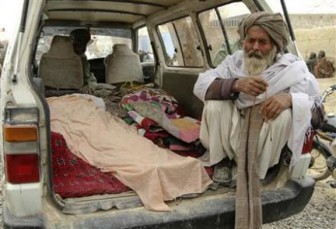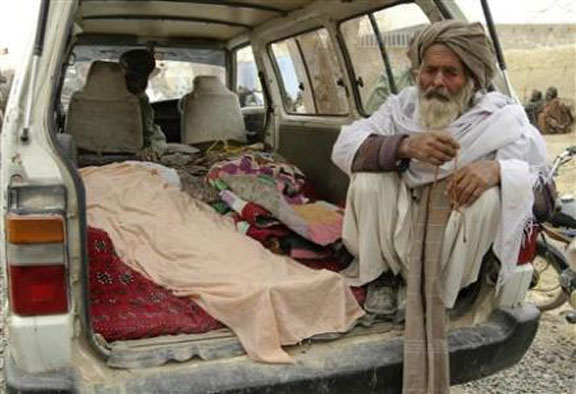KANDAHAR, Afghanistan, (Reuters) – Sixteen Afghan civilians, including nine children, were shot dead in what witnesses described as a nighttime massacre yesterday near a U.S. base in southern Afghanistan, and one U.S. soldier was in custody.
While U.S. officials rushed to draw a line between the rogue shooting and the ongoing efforts of a U.S. force of around 90,000, the incident is sure to further inflame Afghan anger triggered when U.S. soldiers burned copies of the Koran at a NATO base.
U.S. officials said an American staff sergeant from a unit based in Washington state was in custody after the attack on villagers in three houses. Multiple civilians were also wounded, a spokes-man for the NATO-led International Security Assis-tance Force (ISAF) coalition said

President Barack Obama called his Afghan counterpart Hamid Karzai promising to establish the facts quickly and “to hold fully accountable anyone responsible.”
There were conflicting reports of how many shooters were involved, with U.S. officials asserting that a lone soldier was responsible, in contrast to witnesses’ accounts that several U.S. soldiers were present.
The incident was one of the worst of its kind since the U.S.-led invasion of Afghanistan in 2001.
The U.S. Embassy in Kabul said anti-U.S. reprisals were possible following the killings, just as the Koran burning incident a few weeks earlier had touched off widespread anti-Western protests in which at least 30 people died.
Neighbours and relatives of the dead said they had seen a group of U.S. soldiers arrive at their village in Kandahar’s Panjwayi district at about 2 a.m., enter homes and open fire.
An Afghan man who said his children were killed in the shooting spree accused soldiers of later burning the bodies.
Obama said he was deeply saddened. “This incident is tragic and shocking and does not represent the exceptional character of our military and the respect that the United States has for the people of Afghanistan,” Obama said in a statement.
“INTENTIONAL MURDERS”
Afghan President Karzai condemned the rampage as “intentional murders” and demanded an explanation from the United States. His office said the dead included nine children and three women.
Afghan officials also gave varying accounts of the number of shooters involved. Karzai’s office released a statement quoting a villager as saying “American soldiers woke my family up and shot them in the face.”
Minister of Border and Tribal Affairs Asadullah Khalid said a U.S. soldier had burst into three homes near his base in the middle of the night, killing a total of 16 people including 11 people in the first house.
The ISAF spokesman said the U.S. soldier “walked back to the base and turned himself into U.S. forces this morning,” adding there had been no military operations taking place in the area when the incident occurred.
Panjwayi district is about 35 km (22 miles) west of the provincial capital Kandahar city. The district is considered the spiritual home of the Taliban and has been a hive of insurgent activity in recent years.
“I saw that all 11 of my relatives were killed, including my children and grandchildren,” said a weeping Haji Samad, who said he had left his home a day earlier.
BLOOD-SPATTERED WALLS
The walls of the house were blood-splattered.
“They (Americans) poured chemicals over their dead bodies and burned them,” Samad told Reuters at the scene.
Neighbors said they had awoken to crackling gunfire from American soldiers, who they described as laughing and drunk.
“They were all drunk and shooting all over the place,” said neighbor Agha Lala, who visited one of the homes where killings took place.
“Their (the victims’) bodies were riddled with bullets.”
A senior U.S. defense official in Washing-ton rejected witness accounts that several apparently drunk soldiers were involved. “Based on the preliminary information we have this account is flatly wrong,” the official said. “We believe one U.S. service member acted alone, not a group of U.S. soldiers.”
Defense Secretary Leon Panetta called Karzai to offer his condolences. “I condemn such violence and am shocked and saddened that a U.S. service member is alleged to be involved, clearly acting outside his chain of command,” Panetta said in a statement. “A full investigation is already under way. A suspect is in custody and I gave President Karzai my assurances that we will bring those responsible to justice.”
The Afghan Taliban said it would take revenge for the deaths, in an emailed statement to media.
The U.S. Embassy in Kabul said an investigation was under way and that “the individual or individuals responsible for this act will be identified and brought to justice.”
ISAF Commander General John Allen promised a rapid investigation.
Civilian casualties have been a major source of friction between Karzai’s Western-backed government and U.S.-led NATO forces in Afghanistan. NATO is preparing to hand over all security responsibilities to Afghans and all foreign combat troops are scheduled to leave by end-2014.
NATO Secretary General Anders Fogh Rasmussen said the alliance remained firmly committed to its mission and said anyone responsible would be held accountable.
The Koran burning and the violence that followed, including a spate of deadly attacks against U.S. soldiers, underscored the challenges that the West faces as it prepares to withdraw.
Yesterday’s attack may harden a growing consensus in Washington that, despite a troop surge, a war bill exceeding $500 billion over 10-1/2 years and almost 2,000 U.S. lives lost, prospects are dimming for what the United States can accomplish in Afghanistan.
“These killings only serve to reinforce the mindset that the whole war is broken and that there’s little we can do about it beyond trying to cut our losses and leave,” said Joshua Foust, a security expert with the American Security Project.

